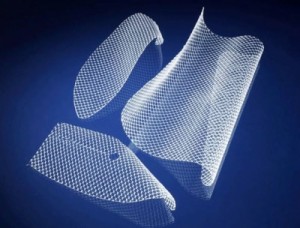 Perhaps so many hernia mesh lawsuits alleging complications would not be pending in court today if the FDA hadn’t relied on its 510(k) process that fast-tracked much of the mesh to market. This new “guide” seems like the agency is now back-tracking.
Perhaps so many hernia mesh lawsuits alleging complications would not be pending in court today if the FDA hadn’t relied on its 510(k) process that fast-tracked much of the mesh to market. This new “guide” seems like the agency is now back-tracking.The FDA says its hernia mesh guide is “providing information to help people make informed decisions about surgical mesh used for hernia repair.” And in response to hernia mesh safety concerns, the agency analyzed the adverse event reports it has received over the past 22 years and reviewed 45 research papers published in the past 11 years. The adverse event reports describe problems including pain, injury and disability, and estimates on the incidence rate of common complications.
Flawed 501(k) Process
What the guide doesn’t say is that most hernia mesh products came to the market via the 501(k) process. Astonishingly, food labels require more critical scrutiny and detailed specifications than medical devices that are not subjected to similar guidelines. The 501(k) means that a medical device doesn’t require human testing. Rather, it can be rushed to market if the manufacturer can prove that the device is substantially similar to one that is already on the market. But this process fails to account for defective medical devices that have been recalled, or have been the subject of patient claims.
For instance, transvaginal mesh (TVM) got to the market via 501 (k) because the manufacturers showed it to be similar to the hernia mesh - even if the mesh was recalled. Now TVM has been pulled from the market after causing countless life-threatening injuries and death.
More people are becoming aware of the FDA’s 501(k) process thanks to the Netflix documentary “The Bleeding Edge”. It features Dr. David Kessler, FDA commissioner under Presidents Bush and Clinton. “When it comes to medical devices we built a system that doesn’t work…The vast majority of devices made today are regrettably cleared via the 501(k) process,” says Kessler. (The FDA and medical device makers declined to be interviewed for the documentary.)
Class 2 Hernia Mesh Recall
Since 2010, some hernia mesh products that have caused problems were recalled by the FDA. And from 2005 to early 2019, most of the hernia mesh recalls were classified by the FDA as Class 2, which means you could “suffer temporary or medically reversible adverse health consequences” from the recalled product.
READ MORE SURGICAL MESH LEGAL NEWS
- Many meshes recently cleared by the FDA have connections through chains of equivalency to devices which have been recalled from the market due to concerns over clinical safety. These findings raise concerns over the efficacy of the 510(k) route in ensuring patient safety.
- Since 2008 and following an escalation in adverse events reported to the Manufacturers and the User Facility Device Experience (MAUDE) database, the FDA has issued a number of notifications associated with the long term and irreversible effects of using some of the surgical meshes available on the market.
- All surgical meshes on the US market are designated by the FDA as potentially posing a moderate risk to patient health (class II) and were cleared through the 510(k) framework.
- Persistent hernia (hernia comes back),
- Adhesion (sticking to organs),
- Obstruction in the intestine (blocked bowels),
- Bowel abrasion (cutting or poking holes in the intestine)
- Pain
- Infection (which caused the death of vaginal mesh campaigner Chrissy Brajcic)

READER COMMENTS
Dennis Hull
on